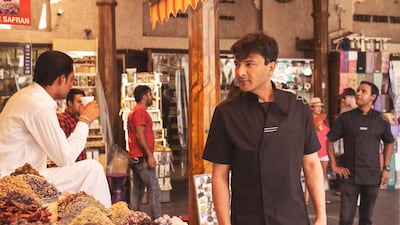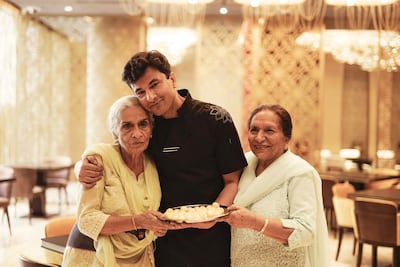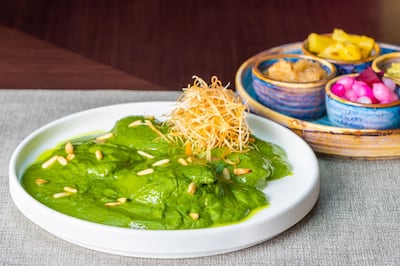Parenting is as much about providing encouragement as putting in a stern word when needed. However, only when the latter is delivered at the right moment does the message hit home.
Michelin-lauded chef Vikas Khanna, the man behind Indian fine-dining restaurant Kinara at JA Lake View Hotel in Dubai, got his talking-to in April last year when he rang his family home in India from the terrace of his leafy New York penthouse.
His mother was on the line from the city of Amritsar, which was then locked in a vicious battle with Covid-19, a situation much of the north of India continues to struggle with. Khanna, 49, was looking for a sympathetic ear.
At the time, he was a few weeks into his Feed India campaign, a relief effort providing food for hundreds of thousands of Indian migrant workers left unemployed and destitute by the pandemic. After a meal container was stolen by a dodgy contractor, Khanna initially decided to pull the plug on the project.
"You need to remember that my team and I were co-ordinating everything, literally, from my apartment in New York, and we really didn't know anyone to work with or trust yet in India," he tells The National. "When that container was stolen, I was so disappointed and I thought it was time to give up because this was too much."
Khanna’s mother, however, wasn’t having it.
"She said: ‘People are dying in your country and you don't want to do this initiative because somebody cheated you? I thought I gave birth to a warrior who stands in the middle of the battlefield,’” Khanna recalls.
“She told me I am the only one on this planet qualified to do Feed India because I understand the logistics of food, business and the money involved. She told me to keep going and people will follow."
Feeding millions from his terrace
It was the fuel he needed to turn Feed India from a failing venture into a fiery movement.
Khanna's mother was right: by leveraging the social media fame that comes with being a celebrity chef, MasterChef India judge and filmmaker, Khanna eventually gained the support of Indian corporates and the government's National Disaster Relief Force to fund and distribute more than 50 million meals across the country.
While supply lines were being built, a process documented through endless scribbled notes stuck on walls across his apartment, Khanna got to work on the terrace creating easy and economical meals to be cooked in industrial kitchens in Mumbai, prior to distribution.
“It was a heart-aching process,” he says.
“We were trying different things and, in some cases, the food would get contaminated during the journey. We figured out that we shouldn't put any lentils or proteins in the rice to ensure nothing gets spoilt.”
After cooking up more than 100 variations from six ingredients, the chef eventually found a menu that was both nutritious and sustainable.
“Two dishes made the cut: a wholewheat bread that we call puri and that will provide an instant dose of carbs; and khichdi, essentially an Indian risotto made from rice, turmeric and salt.
“Indians are obsessed with flavour, so we also provided a slice of pickle to give people the spices they are used to,” says Khanna.
Food as stress relief
However, while Feed India was finding its feet, Khanna’s business plans were falling apart. The financial repercussions of the pandemic meant the planned opening of a New York restaurant was put on ice, while potential ventures in Singapore and China were also on hold.
He says it’s been a blessing in disguise, though.
“With all that is going on, I don’t think I would have had the mental bandwidth to deal with everything. Forget the restaurants, the books, the TV shows … I now have time to focus on simply feeding as many people back home as I can.”
The experience also altered how Khanna views the function of food and the restaurant business. It was a message shared with his team at Kinara upon his arrival in Dubai this month to tweak the menu.
“Part of what we do now is to lower people’s anxiety,” he says. “Because of the world that we are living in, there are so many things that keeps us in that state.
“If you come to a restaurant now, one of the first things you see when you sit down is a QR code and sanitiser, right? While these things are good, they do make you feel worried. So we have to change that feeling; success is not only in delivering great food, but also lowering anxiety.”
Through the additions of palak murgh, a classic North Indian spinach curry dish; and scallops encrusted with podi (a powder made from scratch with lentils, sesame seeds and various spices); as well as the bestselling starter kurkuri dahi, a baked yoghurt, shredded kunafa pastry with Medjool dates and turmeric aioli, Khanna says he is attempting to strike a balance between comfort and creativity in his menu.
Such a move remains a dicey proposition, as both Indian cuisine and the fine-dining Michelin world are steeped in traditions of their own. But Khanna is unapologetic for merging culinary cultures on his menu, as proved by dishes such as tandoori lamb chop with sweet potato mash and green papaya chutney, and braised chicken biryani with mixed berries and yoghurt cucumber dip.
"I say to diners, perhaps this may not look like what you expect, but if you close your eyes and you don't feel transported, then I have failed,” he says.
"I am always willing to play because I am from an extremely competitive world; being one of the first people of colour to win a Michelin star in America brings a certain weight on your shoulders. There are always people ready to dismiss you and say: ‘This not a Michelin dish.’”
A holistic future
Then again, the relentless world of a high-flying chef is far from Khanna’s radar at the moment. With no new restaurants to open or bestselling cookbooks to write, his focus is on Feed India for now.
Besides, he has been in this situation before. Khanna recalls clawing his way back up again after the global financial crisis left him bankrupt in 2008.
This period, too, he says, shall pass.
"I do feel like it is time to reboot my cooking career," Khanna says. “The next chapter is going to be about healing and holistic foods.
“And that comes from the big learning experiences of the past 18 months. I am not the same person now as I was back then, so this is something I want to explore further.”
And if he gets lost along the way, Khanna knows his mother is but one phone call away.
_________________
Read more:
Chef Vikas Khanna on food for the soul and standing up to bullies
The humble idli has come a long way, from breakfast favourite to pandemic staple
Oea: meet the Libyan couple in Wales who set up an online spice shop for a taste of home
_________________




